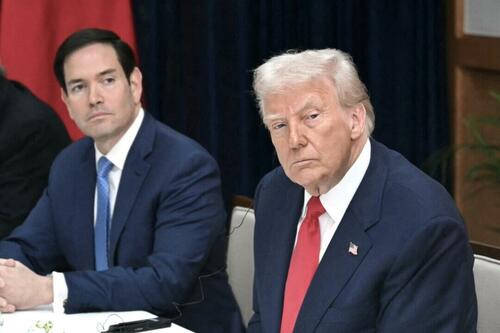Authored by Naveen Athrappully via The Epoch Times,
The U.S. Department of State said on Nov. 6 that 80,000 visas have been revoked.
President Donald Trump and State Secretary Marco Rubio “will always put the safety and interests of the American people first,” the State Department said in a post on X.
The department said in a follow-up post that visas were revoked for reasons including support for terrorism, “actual terrorism,” criminal activity, public safety threats, and overstays.
The State Department also said that 16,000 visas were revoked in 2025 for driving under the influence of alcohol, 12,000 revoked for assault, and 8,000 revoked for theft. The nonimmigrant visa revocation numbers are from the beginning of this year.
The State Department did not offer more details regarding the revocations. The administration has maintained a conservative stance on approving visas for foreigners and has swiftly canceled visa privileges of temporary residents, including students, based on actions concerning national security.
“The Trump Administration will not hesitate to revoke visas from foreigners who undermine our laws or threaten our national security,” Tommy Pigott, the State Department’s principal deputy spokesperson, said in a Nov. 5 post on X.
Recently, the department invalidated visas of foreign nationals for publicly celebrating the assassination of popular conservative influencer Charlie Kirk.
In an Oct. 14 post on X, the department said it was revoking visas of six foreigners, including a South African national who mocked Americans grieving Kirk’s death, saying, “They’re hurt that the racist rally ended in attempted martyrdom.” The other individuals were from Argentina, Brazil, Germany, Mexico, and Paraguay.
“The United States has no obligation to host foreigners who wish death on Americans,” the department said, adding that it “continues to identify visa holders who celebrated the heinous assassination of Charlie Kirk.”
The Trump administration has also reduced the number of nonimmigrant visas issued to foreign nationals.
The visas are issued to foreign citizens on a temporary basis for tourism, business, medical treatment, and certain types of temporary work, while immigrant visas are for people who intend to live and work permanently in the country.
The United States had approved 897,937 nonimmigrant visas in May 2025, according to numbers from the State Department. This is down by more than 16 percent from 1,070,656 such visas issued in May 2024 under the Biden administration.
As for immigrant visas, the department issued 46,751 such visas in May 2025, down by more than 20 percent from the 58,778 issued in May last year.
In late May, the State Department ordered U.S. embassies to pause student visa interviews in an effort to strengthen the vetting process, especially concerning the screening of applicants’ social media accounts.
“We take very seriously the process of vetting who it is that comes into the country,” then-State Department spokeswoman Tammy Bruce told reporters at the time.
This action from the department followed Rubio’s statement in March.
“Coming to the United States on a visa is a privilege, not a right,“ Rubio said. ”The Trump Administration is determined to deny or revoke your visa if you’re here to support terrorists.”
He made the comments amid a rise in student protests on college campuses across the country.
The Trump administration’s crackdown on student visas has been met with opposition from Democrats. In April, a group of Democrats from New York criticized the administration following reports of students from various universities in the state having their visas revoked, according to an April 17 statement by New York state Sen. Patricia Fahy.
Such a “continued assault” on students’ free speech and institutions of higher education undermines the principles of American democracy, she said, adding that students must not feel afraid or powerless because of their immigration status.
“We are deeply disturbed by the Trump administration’s revocation of student visas without justification or explanation,” Fahy said. “The Constitution guarantees fundamental rights and due process to all people, not just U.S. citizens. History tells us that although persecution often begins with attacks on immigrant communities, it rarely ends there, which begs the question: Who is next?”
In June, the department announced new vetting requirements, including social media screening for all student visa applicants. The changes affect applicants for the student, vocational, and exchange visitor visas.
Rubio also announced that the administration would begin revoking visas for students from China, including those with any links to the Chinese Communist Party.
The Chinese communist regime has been accused of monitoring and mobilizing students abroad for the purposes of carrying out CCP directives and spreading its propaganda.
In August, the Department of Homeland Security proposed changes to temporary visas, which included establishing a fixed visa period for nonimmigrant students, exchange visitors, and foreign media personnel to stay in the United States.
The administration has also placed visa restrictions on foreign nationals who engage in censoring Americans, and on H-1B visas issued for importing foreign workers to fulfill specialized roles.
“Even as we take action to reject censorship at home, we see troubling instances of foreign governments and foreign officials picking up the slack. In some instances, foreign officials have taken flagrant censorship actions against U.S. tech companies and U.S. citizens and residents when they have no authority to do so,” the State Department said in a May 28 statement.
Employers must now pay a one-time fee of $100,000 for visas to hire a foreign worker under the H-1B program.
Loading recommendations...
